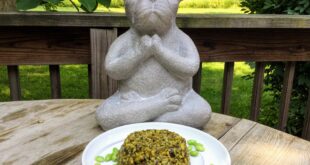
By Dr. John F. Demartini
Do You Know the Golden Rule?
If you want to be loved, love and be lovable.
– Benjamin Franklin
Try as we might, it’s impossible to break the Golden Rule. This supreme universal law of cause and effect encompasses all other truths. Whatever we put energy into-whether it’s a thought, a word, or an action-eventually returns to us like a boomerang. Both the positive and the negative energies we send out into the world roll back like snowballs, picking up size and speed as they return.
If we sow love, we reap love. If we sow hate, we reap hate. It’s such a simple concept that many people miss its deeply profound meaning. This principle is the reason we have the freedom to determinate and choose what we’ll reap or gain in our lives. If we want to receive life’s rich blessings, it’s up to us to earn them. Blessings don’t come to us by way of luck, they’re the results of our productivity and of our words of deeds to others.
This universal law has been illustrated throughout recorded history, and yet the first session with many of my clients is devoted to helping them understand that they’re responsible for the effects in their lives. I remember a man named Morty who complained that all day long his customers treated him impatiently and with very little respect. He was convinced they acted this way because he was a carpet salesman. He didn’t see how his own actions were sowing the seeds for the results he was getting. I asked Morty how he greeted customers when they came into his store. “Whaddaya mean, how do I greet’em? I don’t greet’em. It’s not the welcome wagon, it’s a carpet store!”
“Well,” I asked, “do you check on your customers to see if they need help while they’re shopping?”
“Look, Doc, I don’t think you’re getting gist of what I’m saying here. I run a carpet store. It’s simple. They want carpet and I got carpet! What’s to help? I put tags on every piece of carpeting that give all the details and the price. People are supposed to come in, find what they want, tell me what it is, and pay for it,” Morty explained.
“Morty”, I asked, “do you know life’s Golden Rule?” His eyes went up, then down, and to the side, as if he were peering into his memory, and then he shrugged his shoulders and said, “Nope, sure don’t.”
I spent the next few hours helping Morty understand the Golden Rule and how it works. I explained that when he sent out thoughts of not wanting to be bothered, he planted the seeds for a harvest of customers who treated him with the same lack of respect he felt for them. I suggested that he begin greeting his customers and letting them know that he was there if they needed assistance. He was resistant to the idea, but agreed that he’d try it.
After one month of sowing a sincerely caring attitude for his customers, Morty called to tell me he was reaping respect and making record profits. “Now I know why you call it the Golden Rule!” he said. Then he added, “No-seriously-this stuff really works, and I’ve been saving money on aspirins and antacids, too. Thanks, Doc!”
Your Actions Determine Your Results
I shall never believe that God plays dice with the world.
– Albert Einstein
- Whatever you put energy into today, produces results tomorrow.
- When you think productive thoughts, you attract productive enterprises.
- When you respect and take care of your body, your body produces energy, strength and health.
- Both “good luck” and “bad luck” are illusions. The universe is not a game of chance, it’s a tangible demonstration of cause and effect.
The outcomes you experience in your life are ultimately neither “good” nor “bad”. They’ re merely the predictable effects that result from whatever actions-or lack of actions-you’ve thought of and taken (or not). The universe doesn’t judge, it balances. All compensations you’ve experienced in life are simply the sum of all the energies you’ve sent out in life. Everything you reap, whether you think it’s a good thing or not, has just as many benefits as drawbacks and presents an opportunity for you to learn unconditional love for yourself and others. We know our actions determine our results when it comes to short-term goals in life, like following instructions to put together a toy or an appliance, or mixing all of the required ingredients to bake a cake. But when it comes to long-term causes and effects, we often forget that this same principle holds true.
A few years ago, a man by the name of George came to The Breakthrough Experience in a wheelchair. He had no paralysis, but his knees were so stiffened by arthritis that it was extremely difficult for him to stand and exhausting for him to walk. He had just retired from an architecture firm where he’d worked for 30 years. He came to The Breakthrough Experience to decide what to do with the rest of his life. He said:
I’m 62 years old, and by God I’m going to spend the rest of my life doing something that I want to do. No more dragging myself off to a job that I can’t stand every day, designing cold office buildings that people hate to go to! I liked my job for the first 18 years, but then my supervisor transferred to another division and I never got used to the new guy or his ways. All Karl cares about is profit. The creative part of my job was completely eliminated, and after a while all the projects seemed the same. But I was determined to stick it out until my retirement! And I have to say I gave Karl a run for his money in the meantime. I was no pushover. I made him earn everything I gave him.
I asked George what he wanted to do now, and he said he wasn’t sure. “When I was younger,” he said, “before the arthritis got really bad, I thought I’d design and build dream houses. But now, I really don’t know.” I suggested that we begin The Collapse Process, and explained that it would help to clarify his perceptions. When we experience this truth, we’re immersed in the unconditional love that our heart and soul is always revealing to us, but that we usually block with lopsided perceptions, emotions and lies. George decided that we wanted to complete The Collapse Process on Karl, the supervisor he didn’t like. As George worked on the Collapse, he began to see that he himself had also done all the things he disliked Karl for doing. He also began to recognize a pattern that began at the time Karl was hired as his supervisor and continued up through the time his arthritis became more severe.
I shared with George that a stiffening of knees is sometimes the body’s way of expressing that we don’t want to bend our knees and give in to authority. And I asked him how long he’d been describing his job as one he couldn’t stand. Tears began to come his eyes and he said, “For about as long as I’ve known Karl.” I suggested that he keep working on the Collapse Process until he reached out a point where he could see Karl’s magnificence and knew how Karl was a blessing and had served him in his life.
George was the last person in the program to complete his Collapse that might, but by the time he had, he could see that Karl simply gave back everything that George had dished out over the years. He saw clearly how his own actions determined the results. He was also able to see how his experience with Karl had helped him to grow; how it made him more determined and gave him the courage to start over at the age of 62.
George also realized that he’d been programming his body with thoughts of “holding firm” in the position; “never bowing down” and “not being able to stand” his job. He also recognized the perfection of the many aspects of his relationship with Karl, and he thanked him for being the best teacher that he ever had. When he did, George’s heart opened, tears of gratitude rolled down his cheeks, and a wave of unconditional love swelled in the hearts of everyone present. There wasn’t dry eye in the room when George stood up and walked around the conference table to hug and thank a participant who reminded him-and played out the role-of Karl.
The next day George came to the program without his wheelchair. He was still stiff, but he was walking! He proudly announced that he’d be available to design and build a dream house for anyone who was interested.
Plant Flowers or Forever Pull Weeds
The beginning is the most important part of the work.
– Plato
- When we don’t plant flowers, we forever put weeds.
- Once you plant the flowers, don’t let the weeds take over.
- Every time a weed is pulled, the flowers become more visible.
- Whatever we don’t love in life becomes our weeds.
But in all fairness, one person’s weeds are another’s flowers! When I was a little boy growing up in a suburb of Houston, I lived next door to an elderly woman named Mrs. Grubs. Her beautifully landscaped yard was filled with colorful flowers. Hummingbirds and honeybees daily visited the fragrant honeysuckle blossom. She was a master of gardening and I enjoyed helping her water her gardens.
At that time my parents’ house was surrounded by grass, which was constantly growing up alongside the house, and I was constantly pulling it out. By the time I’d gotten it all pulled on one side of the house and worked my way around to the other side. I’d have to start all over again. It seemed so futile.
One hot day, when I was outside pulling the tall grass and weeds, Mrs. Grubs happened to be in her yard and saw how frustrated I was with my work. She walked over to the fence between the houses and, leaning on her side of the fence, stated something so profound that I can still hear it today.
She said to me, “John, if you don’t plant flowers in your garden, you’ll forever be pulling weeds.” At that age, I learned the lesson literally, but as I grew older and Mrs. Grub’s words lingered in my mind, I began to see how they applied to every aspect of my life.
The Truth is…
If you want to lift yourself up, lift up someone else.
– Booker T. Washington
- It’s impossible to break the Golden Rule of cause and effect; no matter what, you reap what you sow.
- Blessings have nothing to do with so-called luck. They result from your thoughts, words and actions.
- Whether initially you see it as a benefit or a drawback, everything you reap serves you and provides you with an opportunity to sow unconditional love.
- Your health and well-being tomorrow is the result of what you do, think and believe today.
Reflections
A man’s deeds are his life.
– West African saying
- Review your day and look for the link between what you sowed and what you reaped.
- Review your day again, only this time visualize yourself sowing the seeds of what you’d love to reap, and see yourself reaping those loves.
- Think of a situation in your life that somehow improved when you pulled the weeds surrounding it.
- Identify an area in your life that would prosper if you “planted flowers,” then commit to sowing
- whatever you’d most love.
Dr. John F. Demartini is a regular contributor to Conscious Community Magazine.
 Conscious Community Magazine Dedicated to Elevating Consciousness
Conscious Community Magazine Dedicated to Elevating Consciousness



